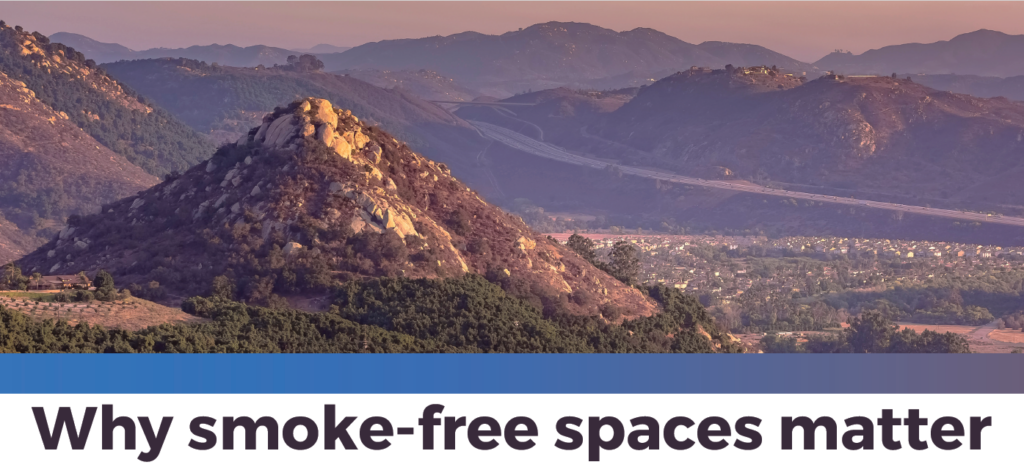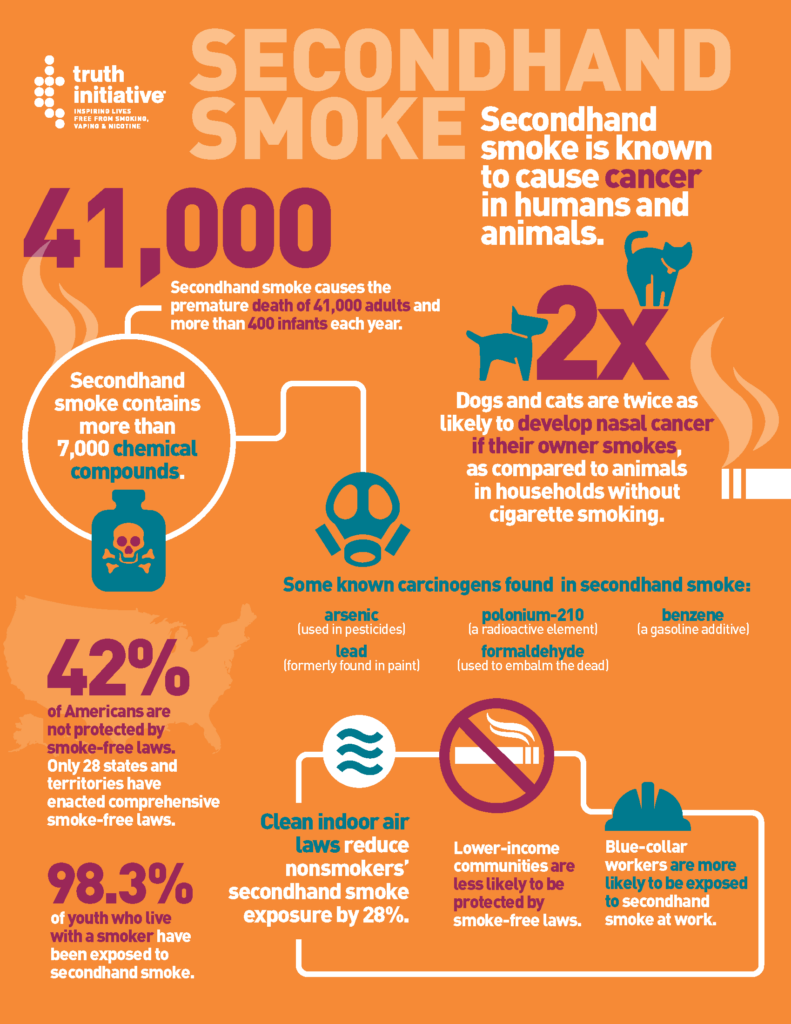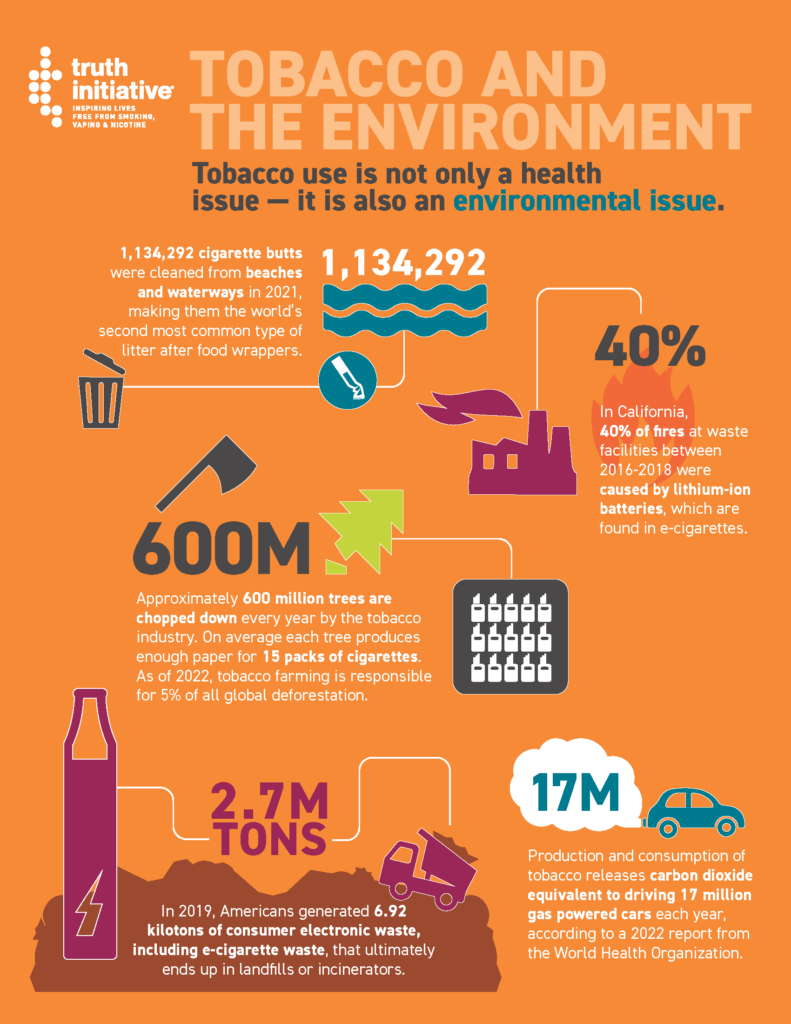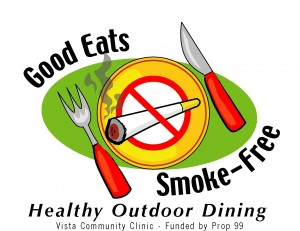Smoke-free Outdoor Public Places

WHAT IS SECONDHAND SMOKE?
- Secondhand smoke (SHS) is smoke from burning tobacco products, like cigarettes, cigars, hookahs, or pipes.
- SHS exposure occurs when people breathe in smoke breathed out by people who smoke or from burning tobacco products.
- All levels of SHS increase health risks
- Completely eliminating smoking is the only way to fully protect people who do not smoke from SHS exposure.

SHS has repeatedly been identified as a health hazard, and the U.S. Surgeon General has concluded that there is no risk-free level of exposure to SHS. SHS contains more than 7000 chemicals which includes toilet cleaner, sewer gas and formaldehyde. In fact, 70 of those chemicals causes cancer.
Those who are most effected by SHS exposure are kids and adults with asthma. If they are anywhere near someone smoking, they are at risk for a deadly asthma attack. The CDC states that SHS is a common trigger for asthmatics. Not only that, SHS also causes respiratory infections and airway constrictions.
Many other outdoor areas can be smoke-free, such as parks, sidewalks, golf courses, colleges, hospitals, healthcare campuses, public attractions, and worksites. These smoke-free policies provide protection to the general public, visitors, and workers. As a result, many states, cities, and countries are beginning to enact laws that require all workplaces and public places to be smoke-free.
All parks and beaches in San Diego County are 100% smoke-free. There are several other smoke-free places in North San Diego County like the San Diego Zoo Safari Park, Vista Wave Waterpark, Palomar College, Mira Costa College, California State University San Marcos, Tri-City Medical Center, Vista Community Clinic, and Palomar Hospital. However, gaps in protections remain. Cities can provide protection from SHS exposure in outdoor non-recreational public areas (such as walkways, streets, plazas, shopping center, transit stops, farmers’ markets, swap meets, and college/trade school campuses) and outdoor recreational areas like outdoor recreational facilities and venues including their parking lots.
HEALTH IMPACTS OF SECONDHAND SMOKE (SHS)
The chemicals in SHS can cause the development of life-altering diseases in adults who have never smoked. Some of the possible diseases include: coronary heart disease, stroke, and lung cancer. Premature death can also be a result of SHS exposure. Reproductive health concerns also arise when exposure occurs during pregnancy. There’s also some evidence suggesting SHS might be linked in adults to cancers of the:
- Larynx (voice box)
- Nasopharynx (the part of the throat behind the nose)
- Nasal sinuses
- Breast
Beyond pregnancy, infants and young children exposed to SHS are at an increased risk for sudden infant death syndrome (SIDS), acute respiratory infections such as pneumonia and bronchitis, middle ear disease, more frequent and severe asthma, respiratory symptoms, slowed lung growth, and certain childhood cancers such as lymphoma and leukemia.

ENVIRONMENTAL ISSUES WITH SECONDHAND SMOKE (SHS) AND TOBACCO PRODUCT WASTE (TPW)
SHS was declared a toxic air contaminant by The California Air Resources Board. Now SHS is considered to be among the most toxic automotive and industrial air pollutants. SHS may be elevated in outdoor areas and when near areas where smoking is permitted. Thus, placing community members at an increased risk of SHS exposure.
Additionally, the litter that is a direct result of tobacco products such as cigarettes and vapes are also of great concern when considering southern California’s environment. When cigarettes and vapes are improperly discarded they threaten our environment and aquatic ecosystems. The substances that leach out of these tobacco products are highly toxic to micro-organisms and decrease water and soil quality.
For example, cigarette filters are made from plastic, thus not biodegradable and as a result they contaminate oceans and wildlife habitats.
There are more than 4.5 trillion cigarette butts worth of litter, making it the second most littered item in the world and the most frequently littered item in U.S beaches and waterways. This is especially dangerous when considering that cigarette butts are poisonous when ingested.

FIRE RISKS ASSOCIATED WITH TOBACCO PRODUCTS WASTE (TPW)
Improperly discarded smoking tobacco products have been linked to large wildfires, resulting in the destruction of wildlife, vegetation, and property. For example, fires induced by cigarettes can quickly escalate and burn hundreds of acres of land. This is especially significant as wildfires in California become increasingly more common.

Another aspect to consider is the possibility of fires caused by electronic cigarettes (e-cigarettes) or vapes. Fires from these products can happen while the e-cigarettes or vapes are being used, charged or transported. Battery failures can lead to explosions.
What are the fire risks associated with vaping and e-cigarettes?
- Battery explosions: Lithium-ion batteries used in e-cigarettes and vaping devices can overheat and explode, causing fires.
- Charging: Overcharging or using incompatible chargers can also cause batteries to overheat and explode.
- Improper storage: Storing e-cigarettes and vaping devices near flammable materials can increase the risk of fire.
- Improper disposal: Throwing away batteries or devices in the trash can lead to fires if they encounter other materials.
Fire prevention should be of the utmost importance. It only takes one lit cigarette or improperly disposed vape to cause a fire, it is especially dangerous when they are tossed on flammable surfaces like dried grass and at gas stations. Much of the unincorporated areas of San Diego County is surrounded by dried grass and foothills and is considered a high risk fire zone. Smoke-free policies would offer preventative measures that help reduce fire risks.
SMOKE-FREE PLACES IN CALIFORNIA
- 25 feet from tot lots, playgrounds, and certified farmers’ markets
- State Parks and Coastal Beaches
- Public and Charter School Campuses
- 20 feet from main entrance/exit, operable windows of government buildings
In North San Diego County, there are several cities that currently have SFOPPs policies in place. However, not all cities in North San Diego County have these policies in place leaving many unprotected from SHS exposure. Thus, Vista Community Clinic’s Tobacco Control Program, the North Coastal Prevention Coalition (NCPC), and youth advocates are working towards helping extend those protections to North San Diego County cities: Escondido, Vista, and the Unincorporated areas of San Diego.
SMOKE-FREE PLACES IN ESCONDIDO
Smoking is prohibited in all city parks, recreation areas, and all outdoor dining areas in Escondido. Many strides have been made in Escondido, including the banning of hookah lounges in 2009.
SMOKE-FREE PLACES IN VISTA
Smoking is prohibited in all parks, at Vista Civic Center and Library, at the Moonlight Amphitheatre, and in unenclosed dining areas. In 2013, a ban on electronic smoking devices where smoking is not allowed was also established.
SMOKE-FREE PLACES IN UNINCORPORATED SAN DIEGO COUNTY
Smoking is prohibited in all outdoor dining areas, and within 25 feet from the perimeter of such area. Additionally, smoking is prohibited within 40 feet from a permitted food facility that is a mobile food or temporary food facility, such as a food truck or food cart.
To further strengthen tobacco regulation in Escondido, Vista, and the Unincorporated Area of San Diego County, a policy that eliminates smoking in ALL outdoor public places without designated smoking areas or distances should be implemented. Further tobacco regulation protects and promotes health amongst the community.
POTENTIAL BENEFITS OF SMOKE-FREE OUTDOOR PUBLIC PLACES (SFOPPs):
- Closes the gaps in smoke-free laws
- Protects the most vulnerable populations (e.g. children, people with asthma, elderly, and pregnant women)
- Reduces exposure to SHS exposure
- Helps those trying to quit tobacco products by eliminating the sight and smell of tobacco use
- Improve health of outdoor workers and the general population
- Reduce fire risks
- Protects wildlife and waterways
- Reduces tobacco and vape product waste
- Reduce youth smoking and sends message that tobacco use is not the community norm
- Reinforces the message of healthy living to youth

-
-
-
-
-
-
-
-
- Contact your City Council and express your concerns:
- Talk with your family, friends, and neighbors about this topic
- Share this website and provided resources to others
- Contact VCC Tobacco Control Program at:
- Email: [email protected]
- Call: 760-631-5000 ext 1001
-
-
-
-
-
-
-
REFERENCES AND ADDITIONAL INFORMATION:
Centers for Disease Control and Prevention [CDC]: General Information About Secondhand Smoke
American Cancer Society: Health Risks of Secondhand Smoke
Truth Initiative: Secondhand Smoke Infographic
UNDO: Environmental Destruction – Cigarette Butts are Toxic Waste
Truth Initiative: Tobacco and the Environment Infographic
Fire Industry Association: Fire Risks of Vaping and E-Cigarettes
Tobacco Stops With Me: Secondhand Smoke Facts
American Lung Association: Health Effects of Secondhand Smoke
Smoke-Free Outdoor Dining: San Diego County
Smoke-Free Outdoor Dining

Smoke-free Outdoor Dining is Good for Business and Good for Health!
More than 180 cities and counties across California have passed ordinances for smoke-free outdoor dining, including Carlsbad, Coronado, Chula Vista, Del Mar, El Cajon, Encinitas, Escondido, Imperial Beach, La Mesa, National City, Oceanside, San Marcos, Solana Beach, Vista and the Unincorporated Areas of San Diego County.
Vista Community Clinic’s Tobacco Control Program is working to extend those protections to all our North County communities.
Smoking in outdoor dining areas not only exposes patrons and their families to secondhand smoke, but the employees working in these outdoor areas. There is no safe distance from cigarette smoke and it does not go away just because it is outside. Adults, children, pets and employees are all exposed to secondhand smoke on outdoor patios.
Several restaurant owners have adopted voluntary no-smoking policies, but cities can expand those protections to all. To see a list of restaurants with voluntary smoke-free policies, click here.
On June 28, 2022, Vista joined all other North County cities in adopting a policy prohibiting smoking and vaping on outdoor dining patios.
The ordinance took effect on July 29, 2022, but the City has allowed a grace period for businesses to fully implement and post required signage.
The North Coastal Prevention Coalition (NCPC), Vista Community Clinic (VCC), and youth advocates are pleased to help implement the policy and deliver signage and information to local businesses in September 2022.
Additional information can be found at the links below:
- Copy of letter from City of Vista sent to businesses in July 2022
- Copy of Vista Municipal Code 8.12
- Sign pdf if you need additional copies at entrances to your dining patio
- Sticker pdf

Follow us on Facebook @vcctobacco for resources, information, local, state and national tobacco-related news and upcoming events and trainings
Follow us on Instagram and Youtube @sdstayinformed to stay up-to-date on VCC Tobacco Control events, news and facts

